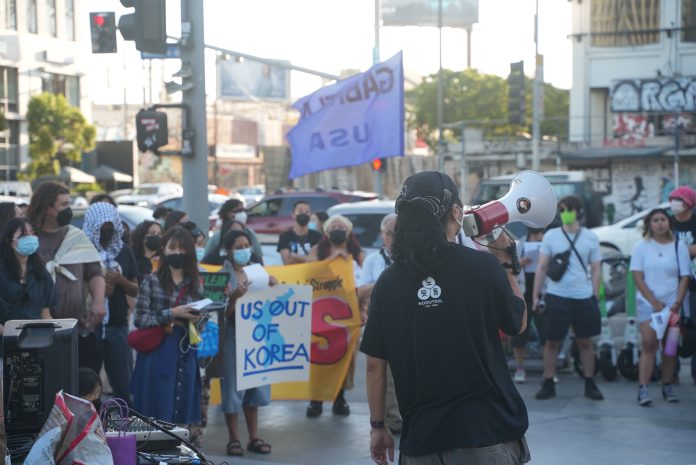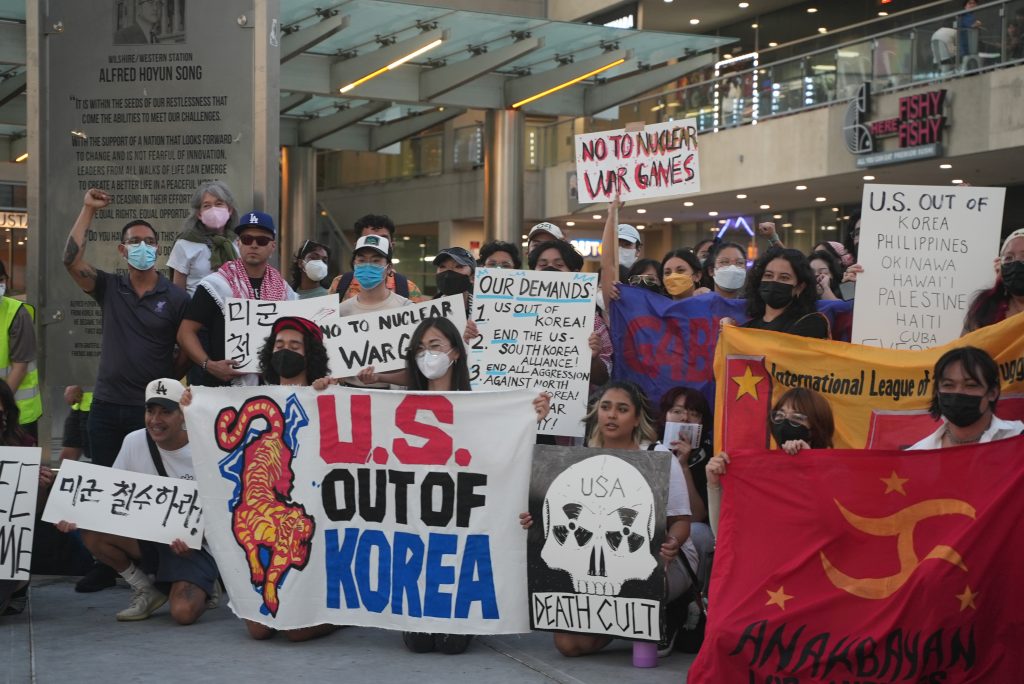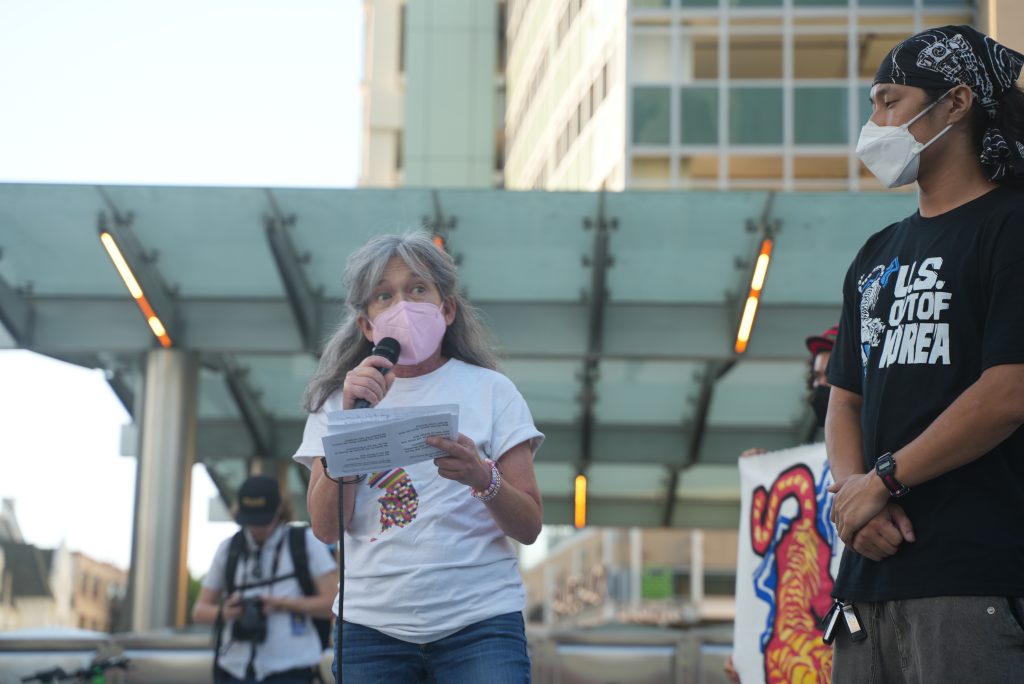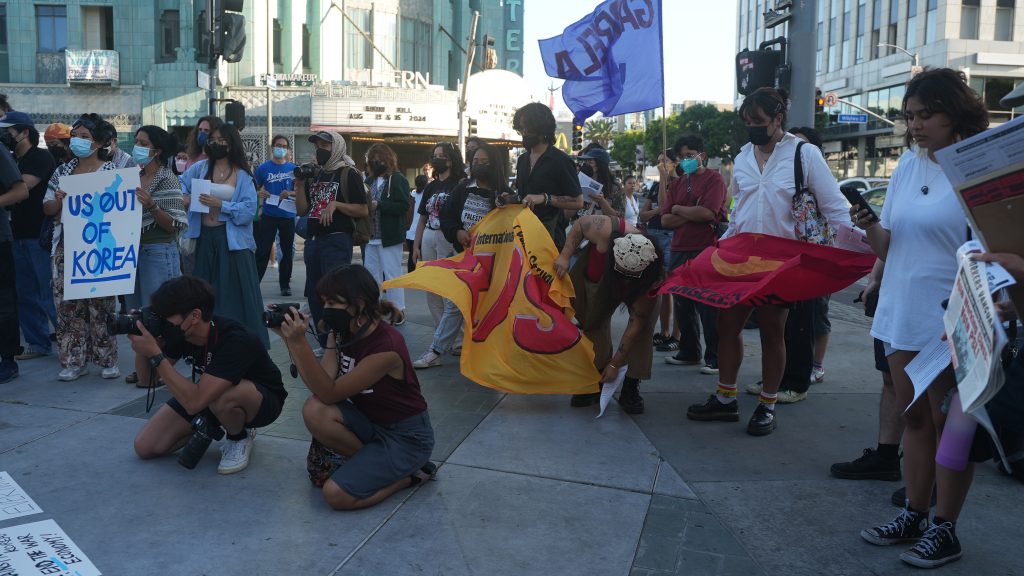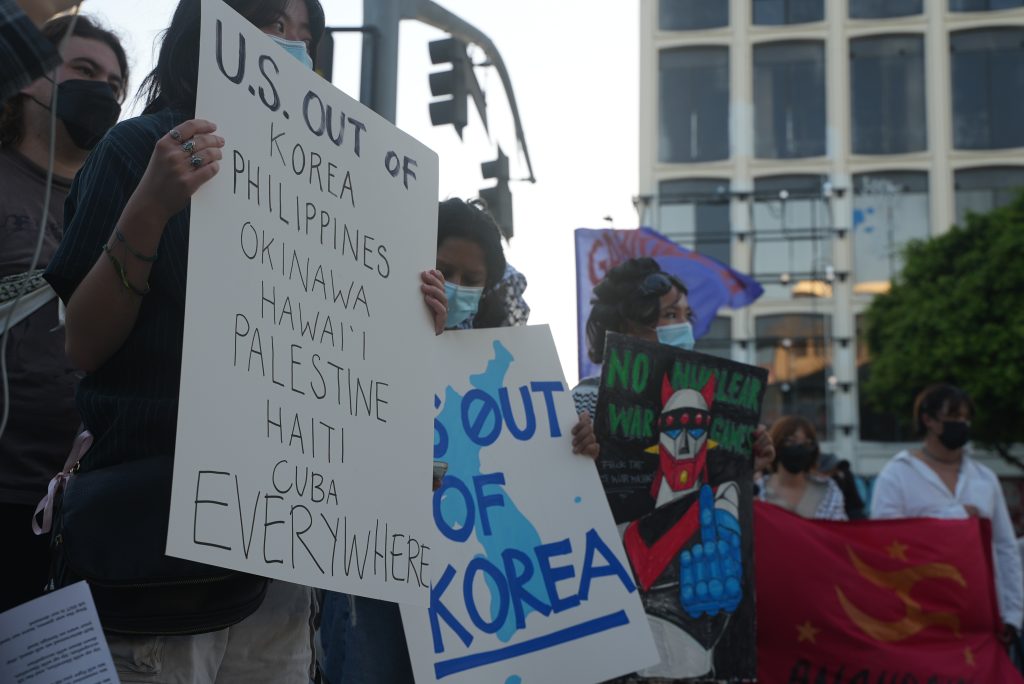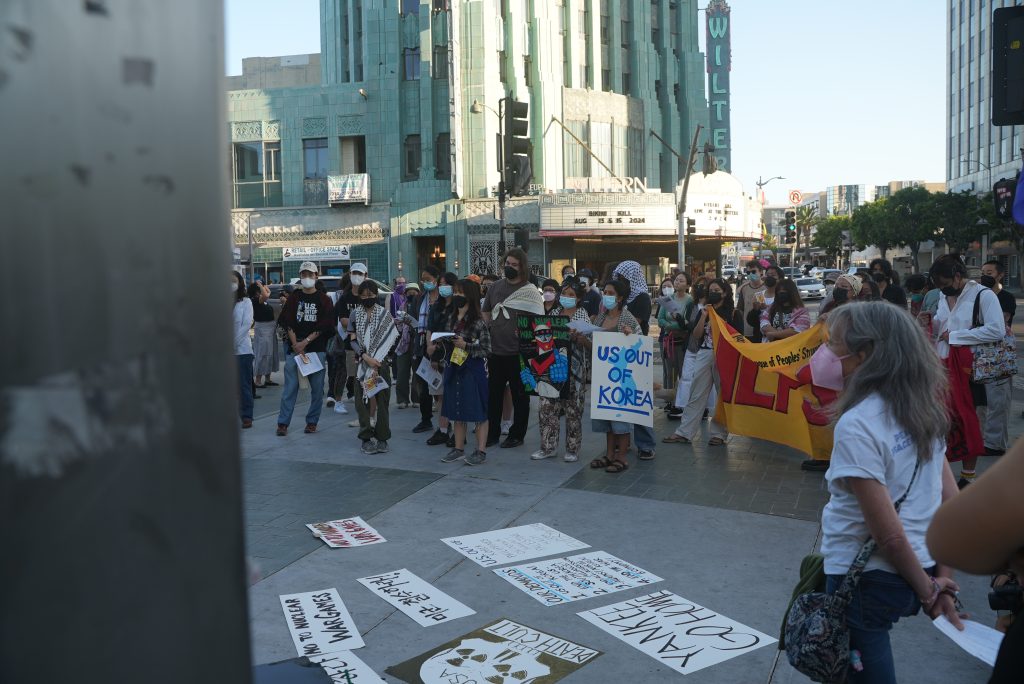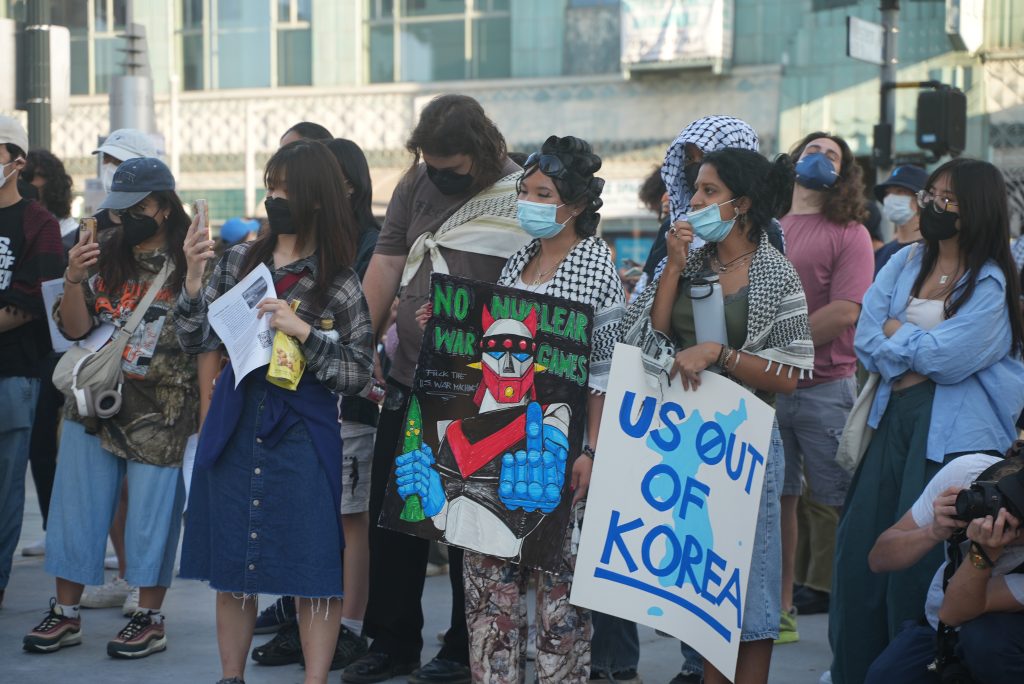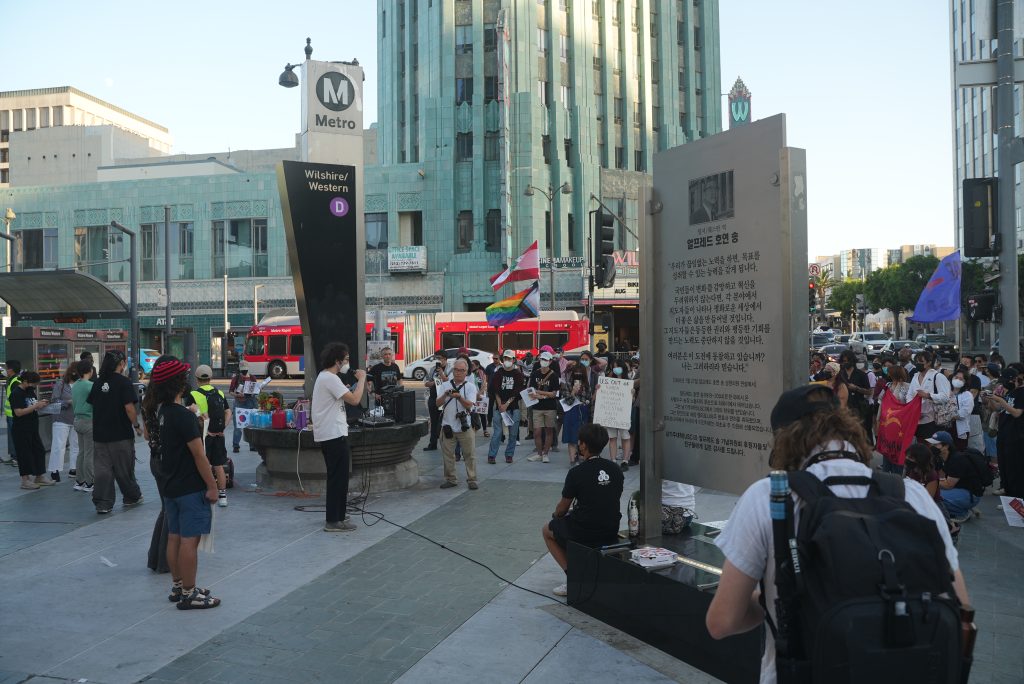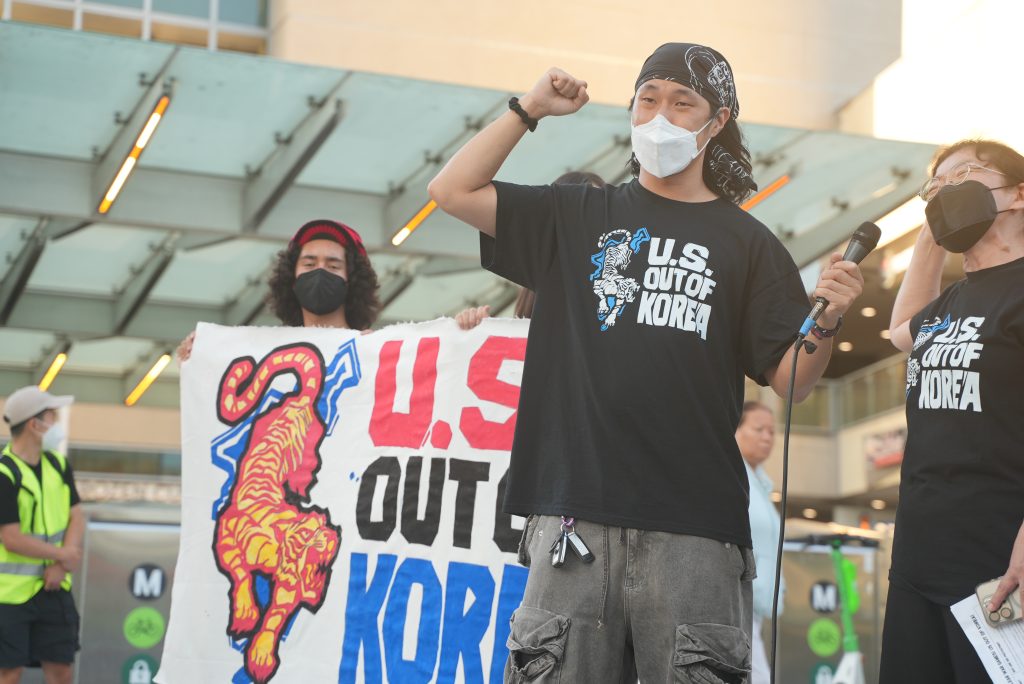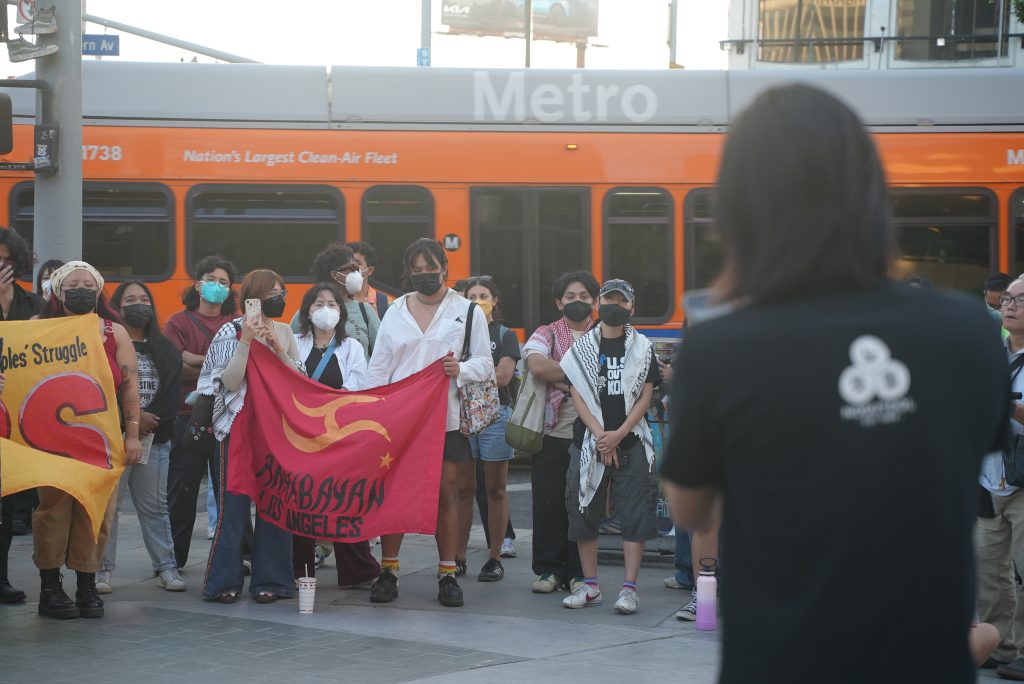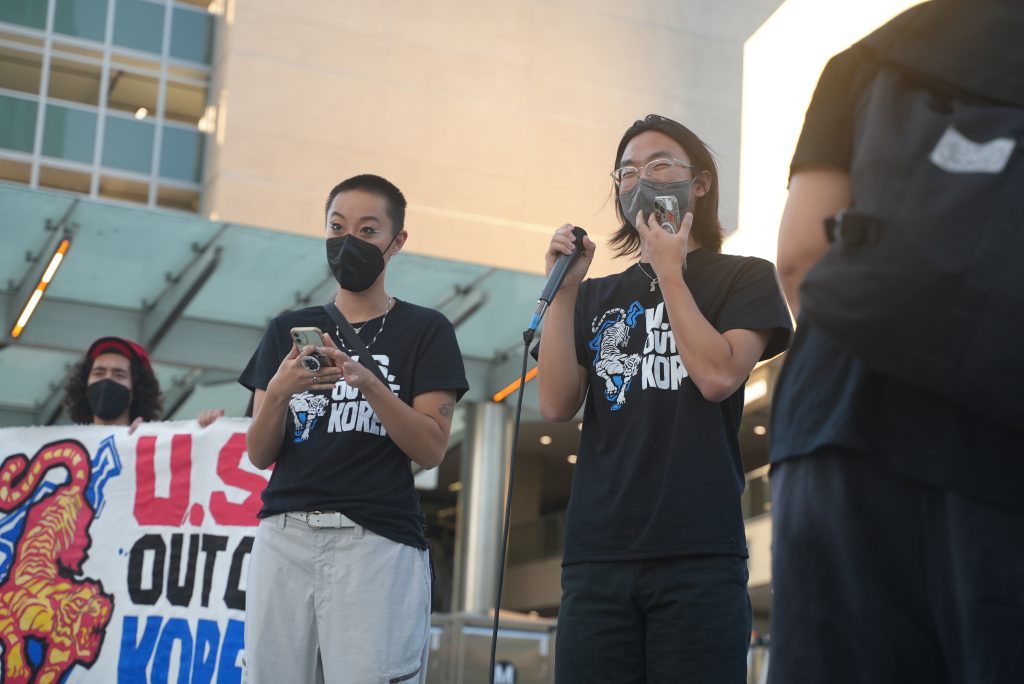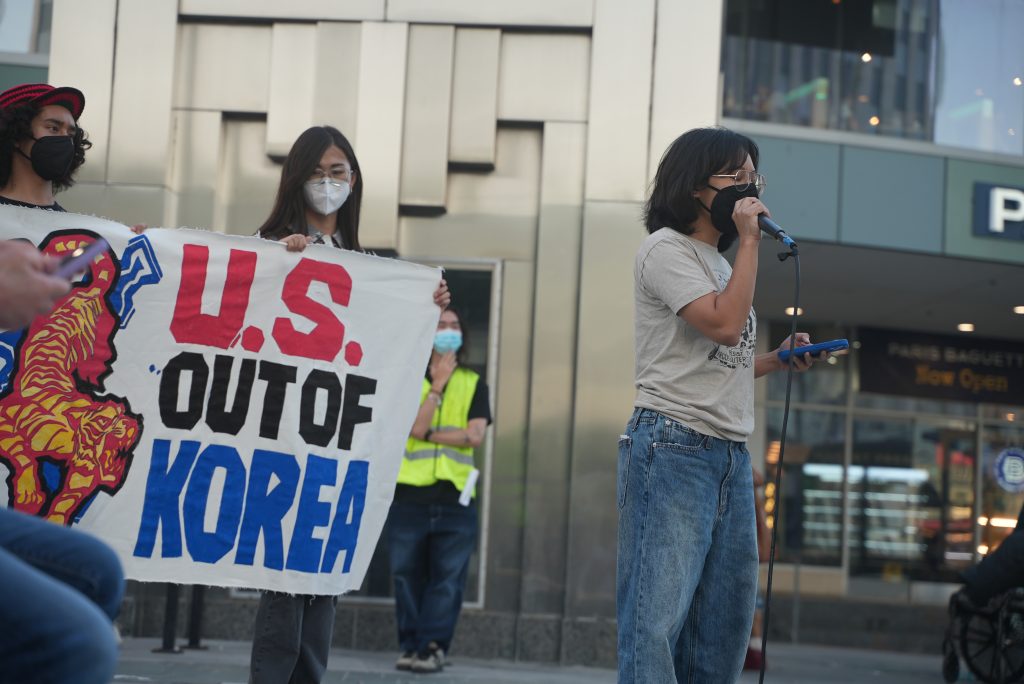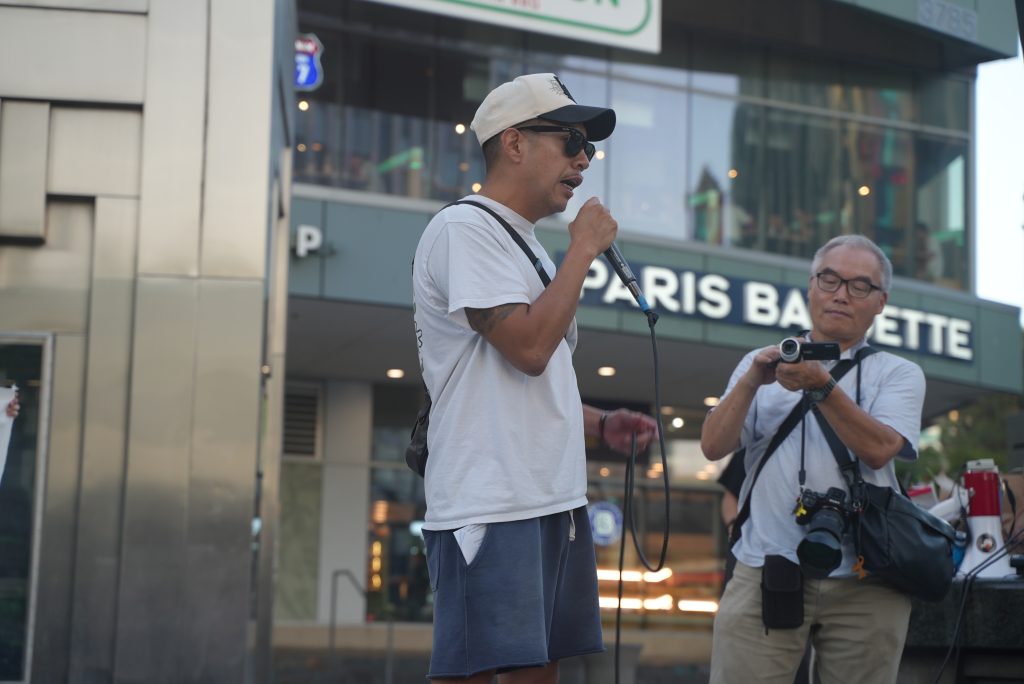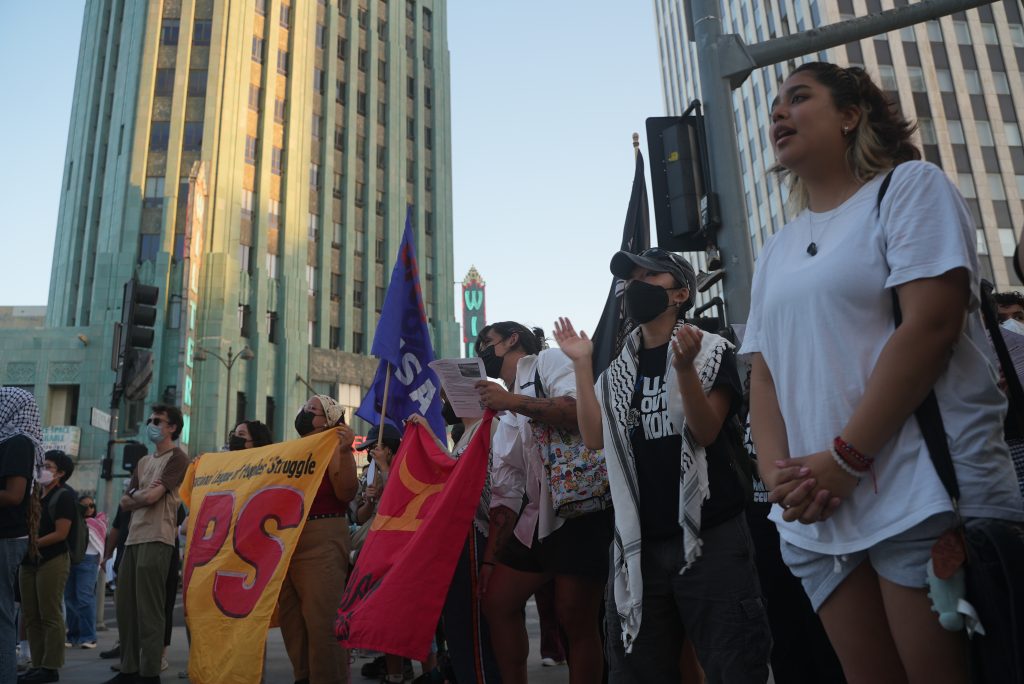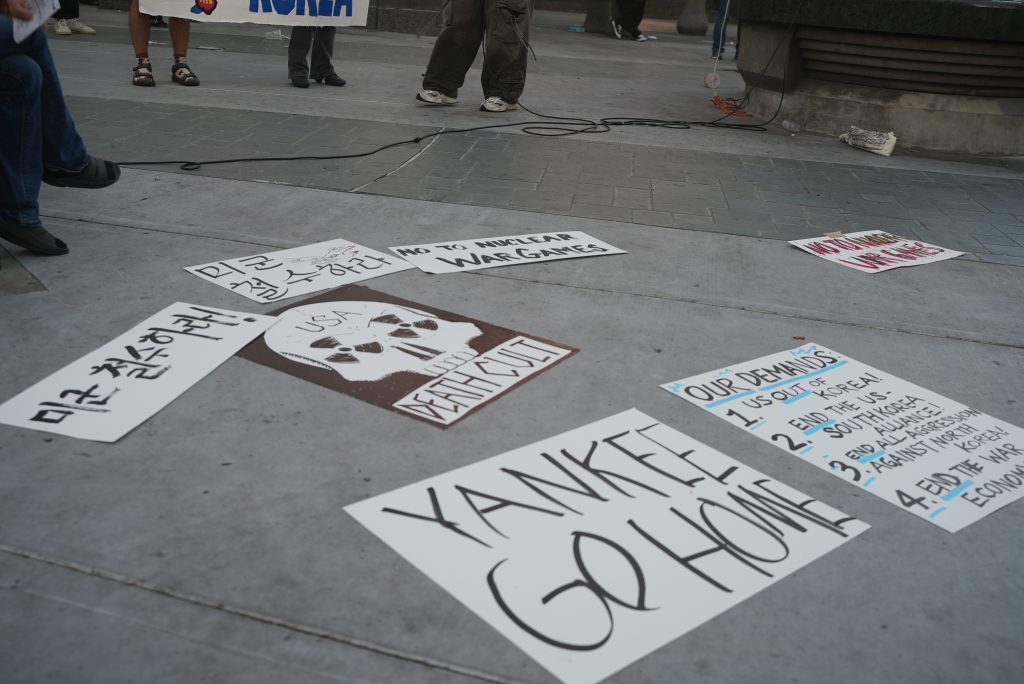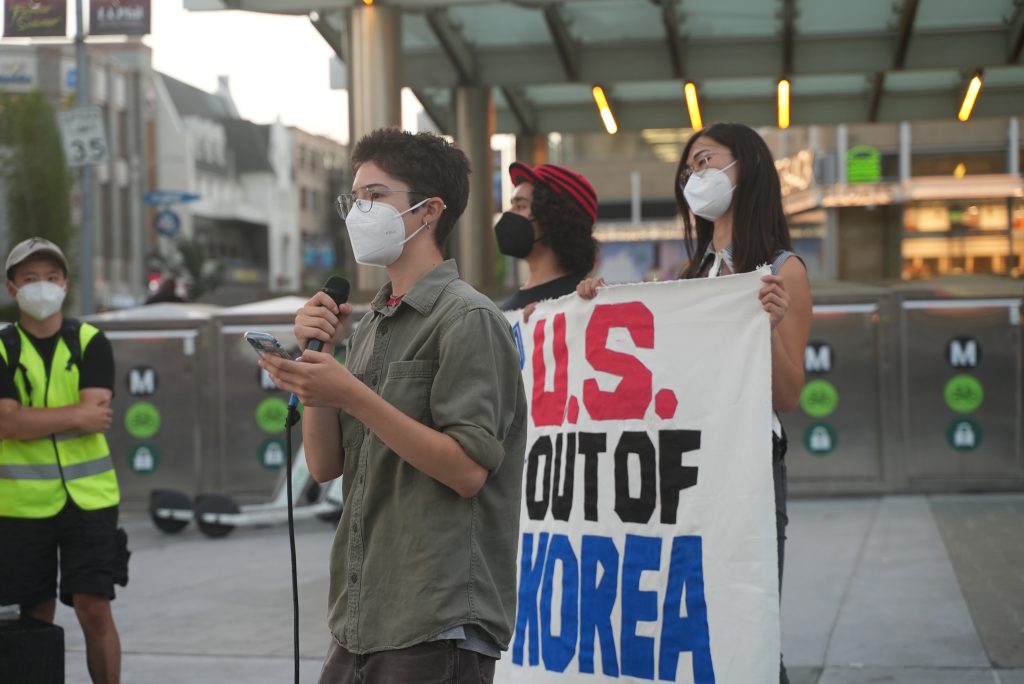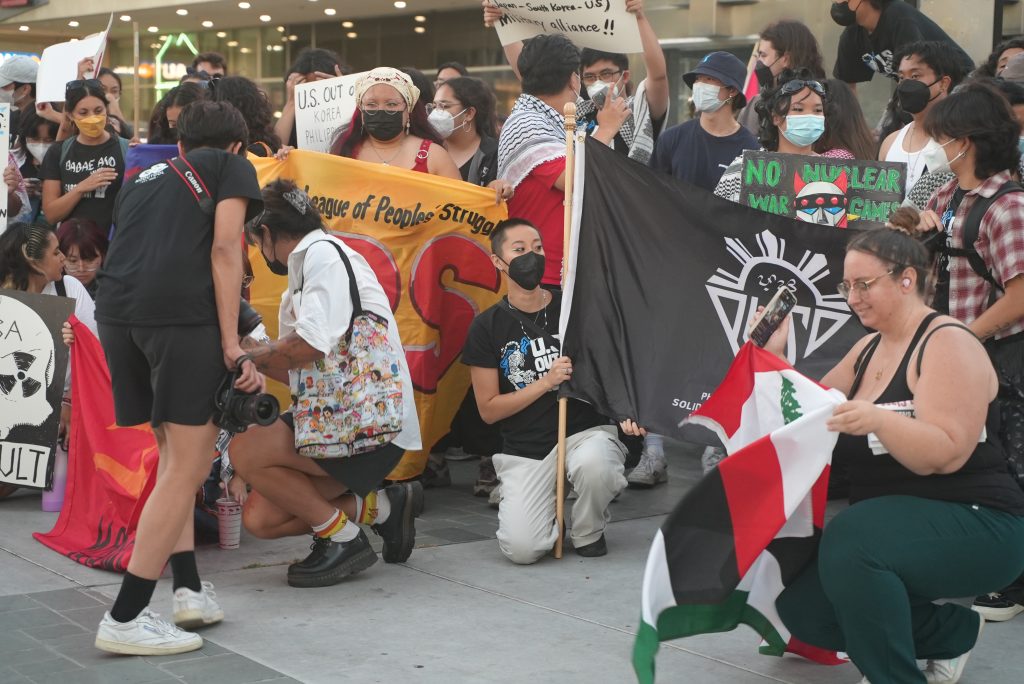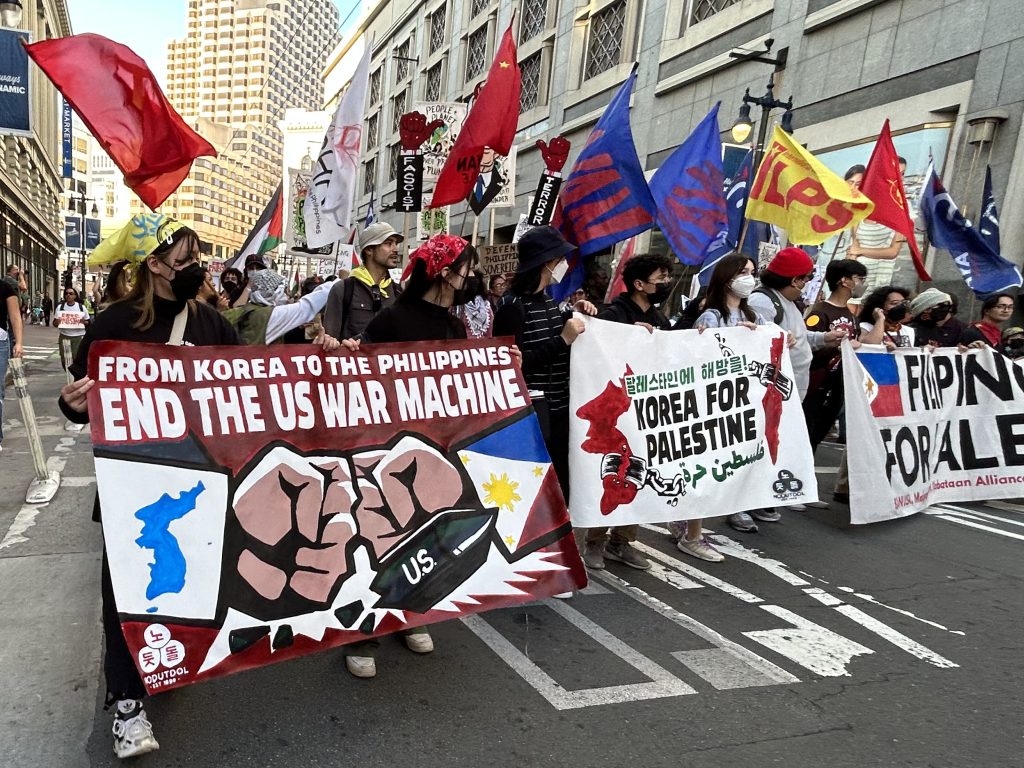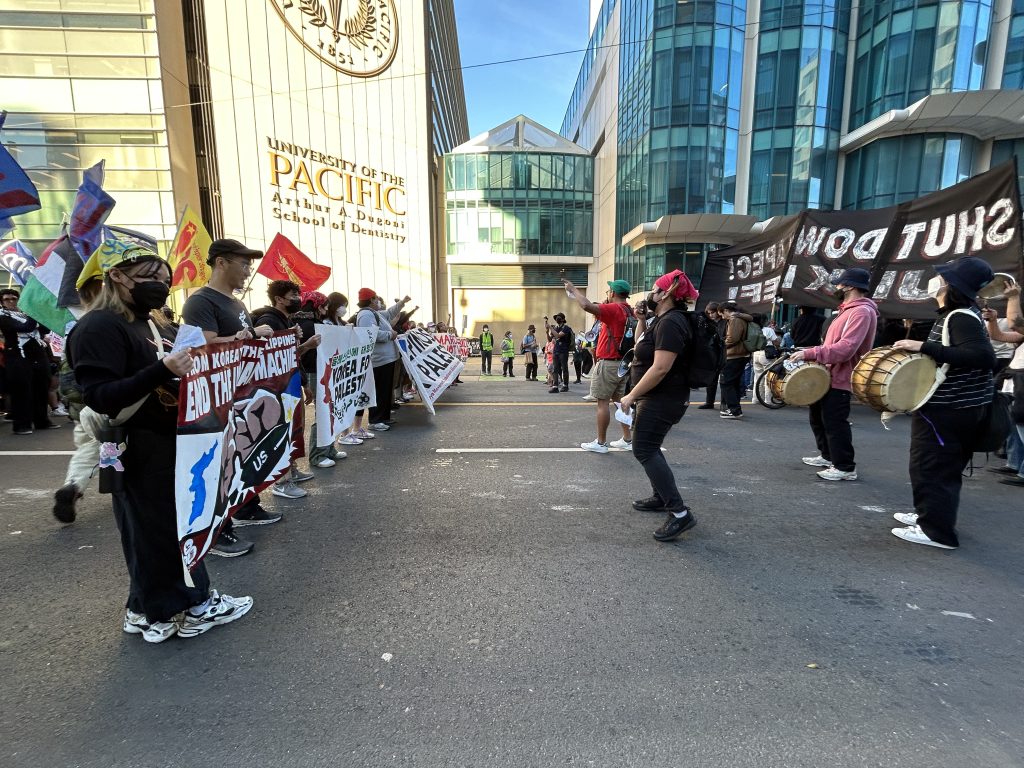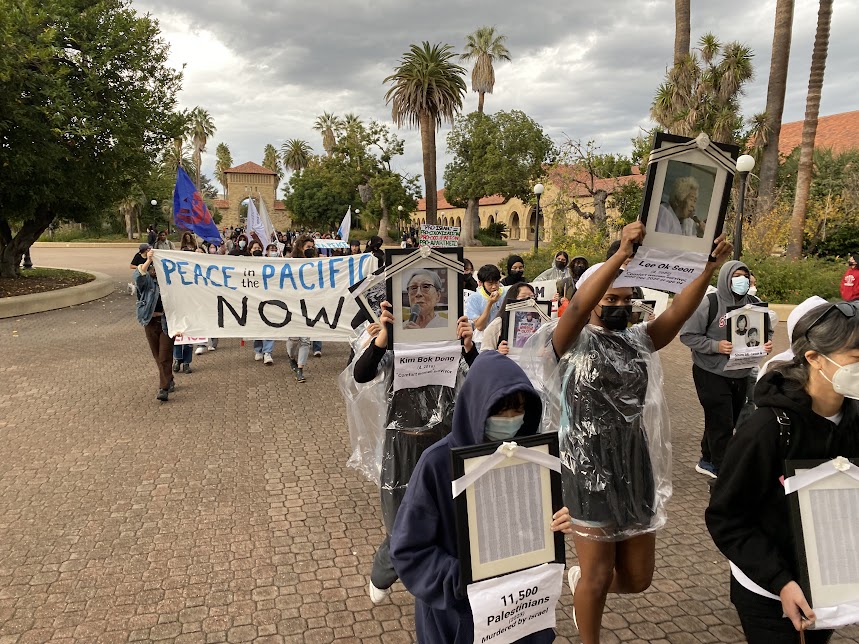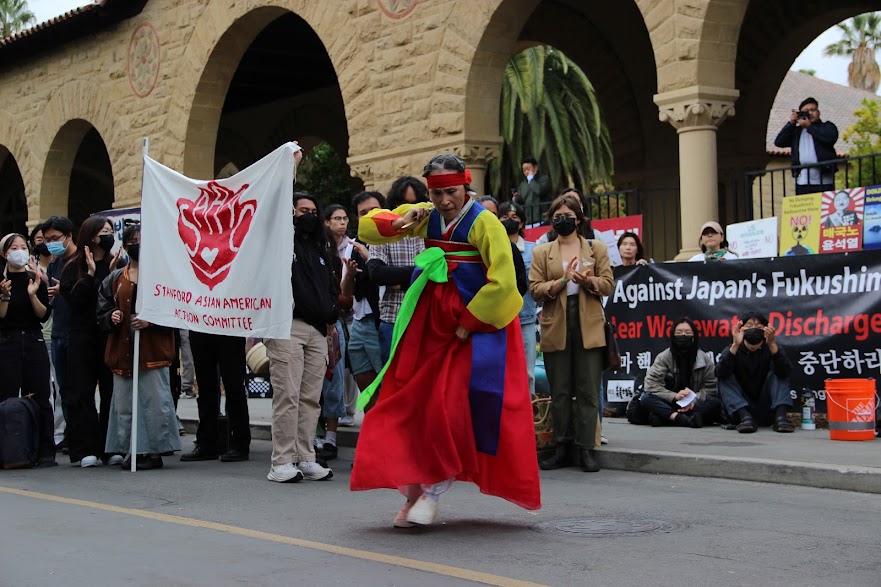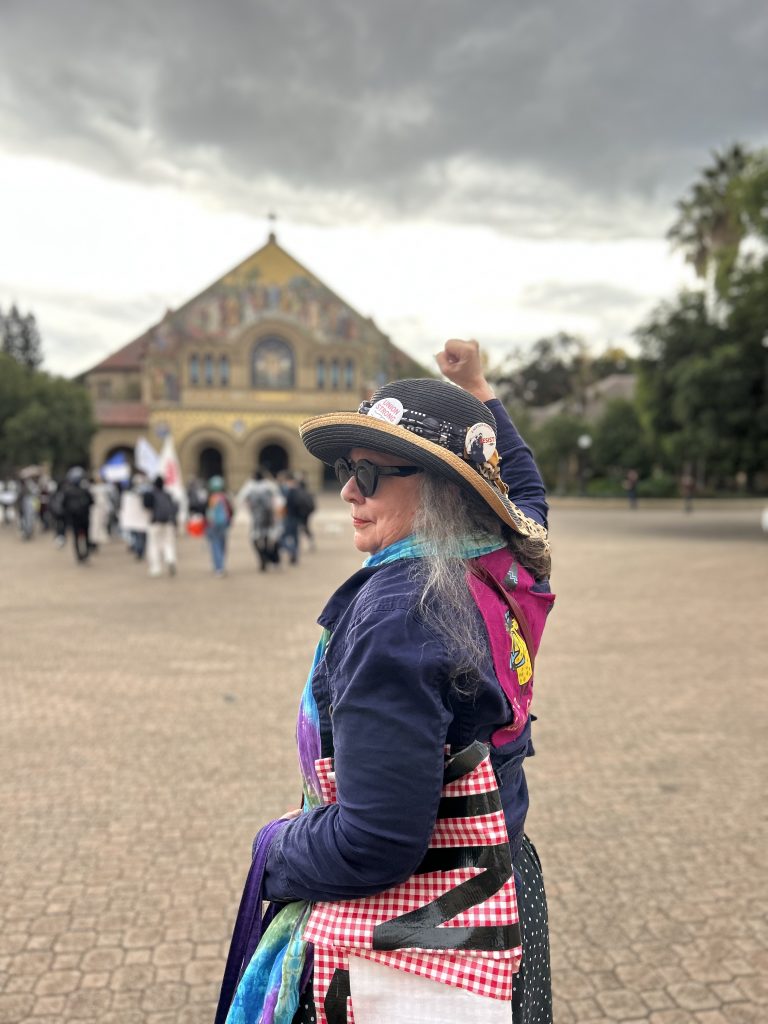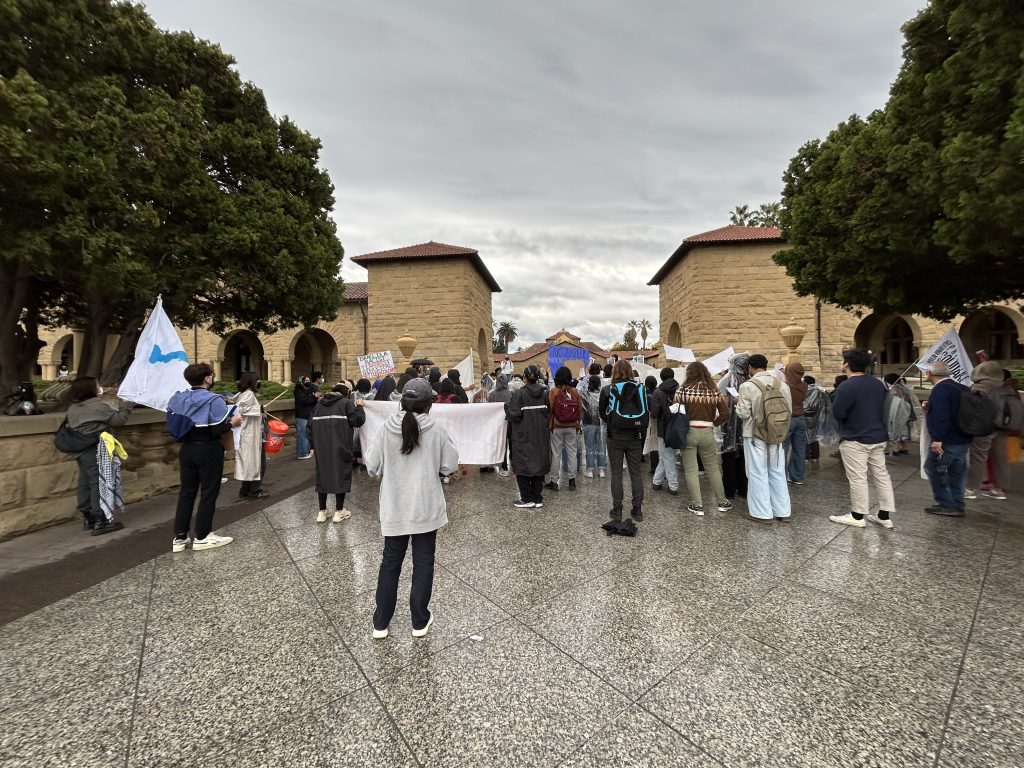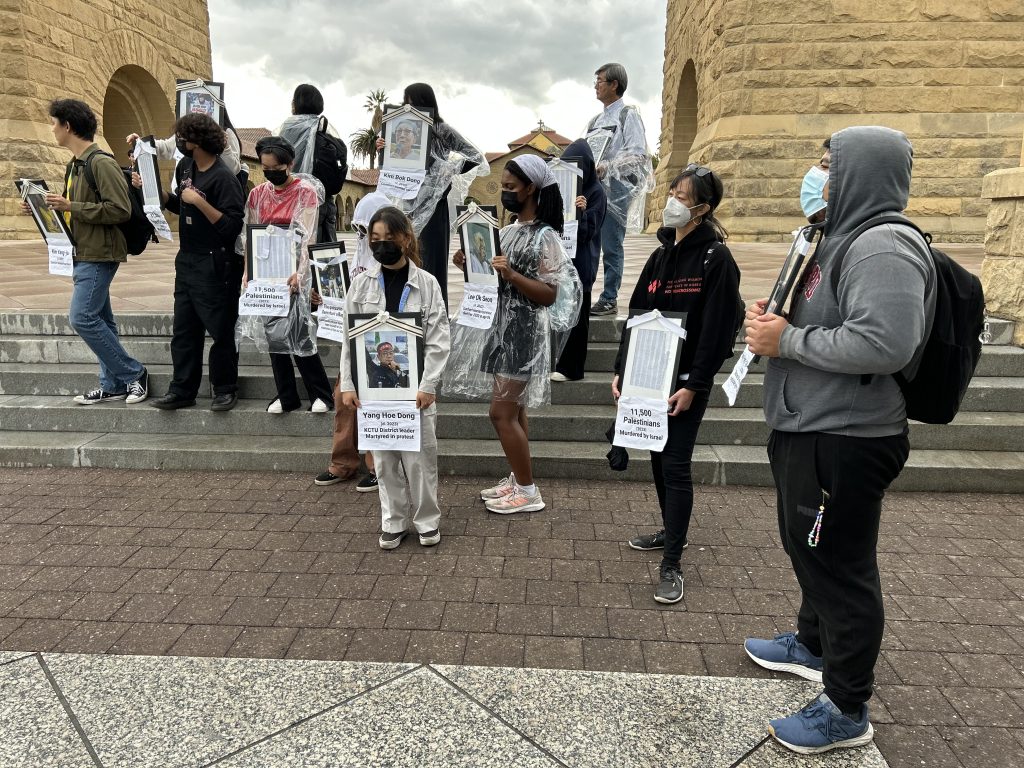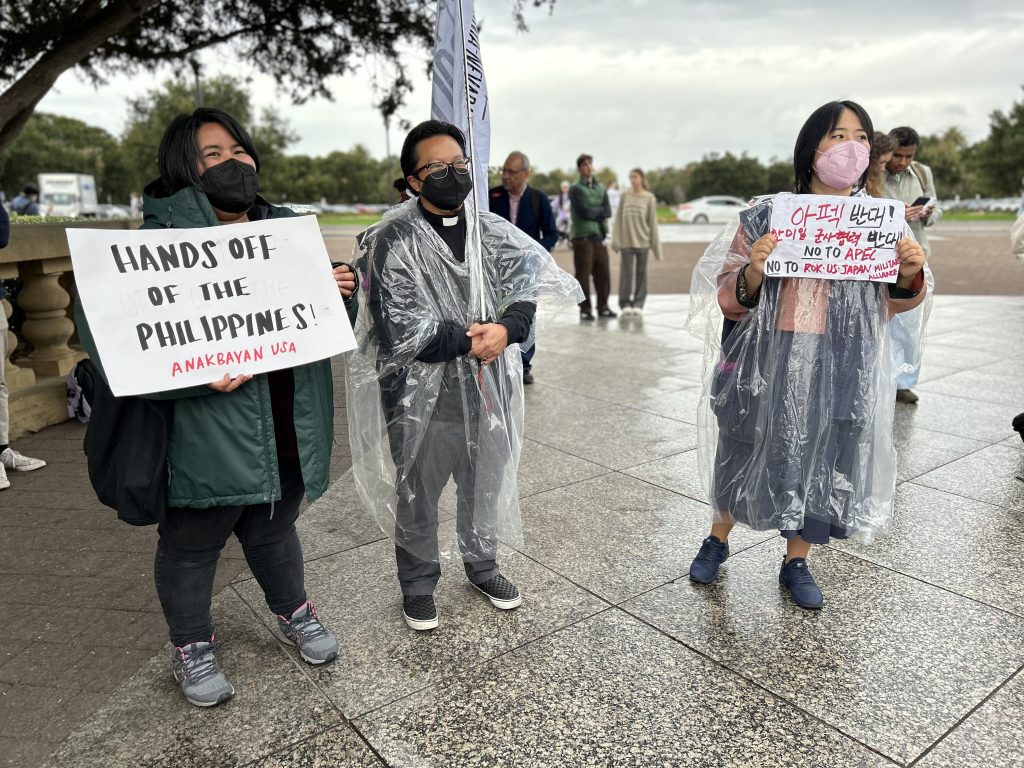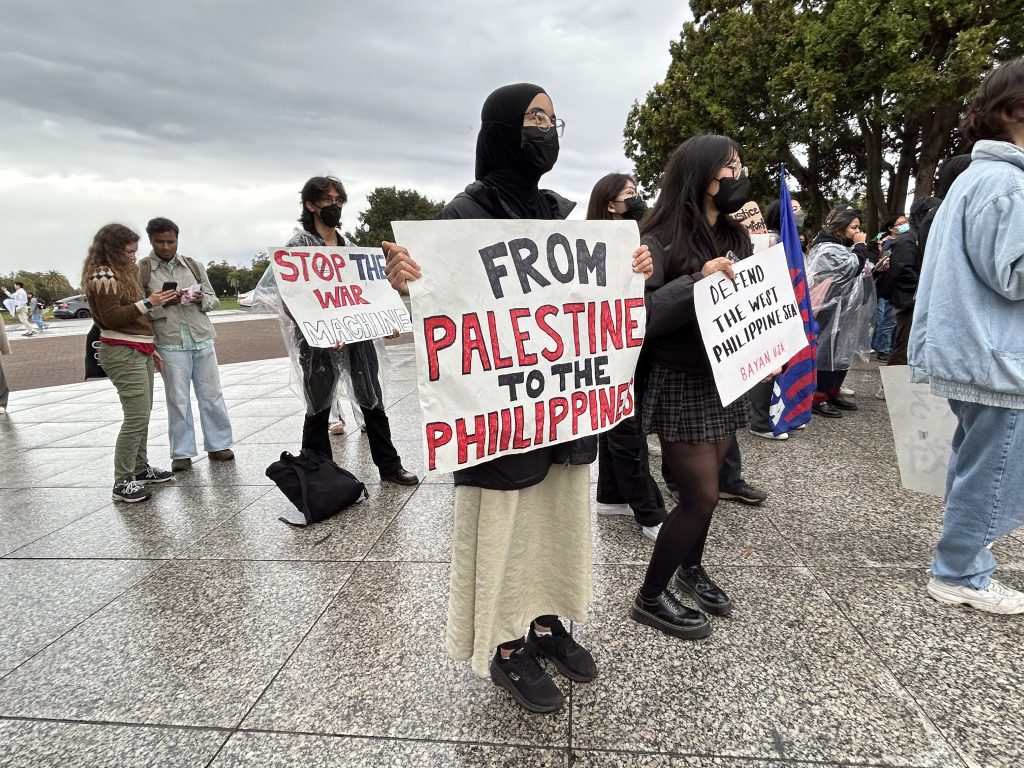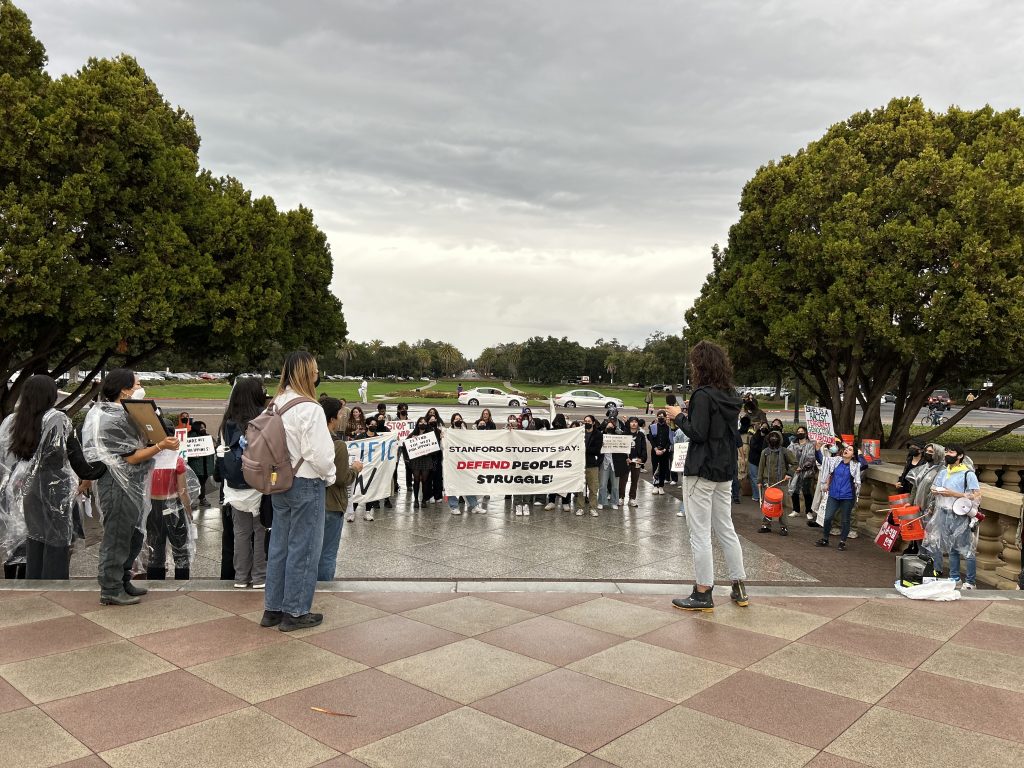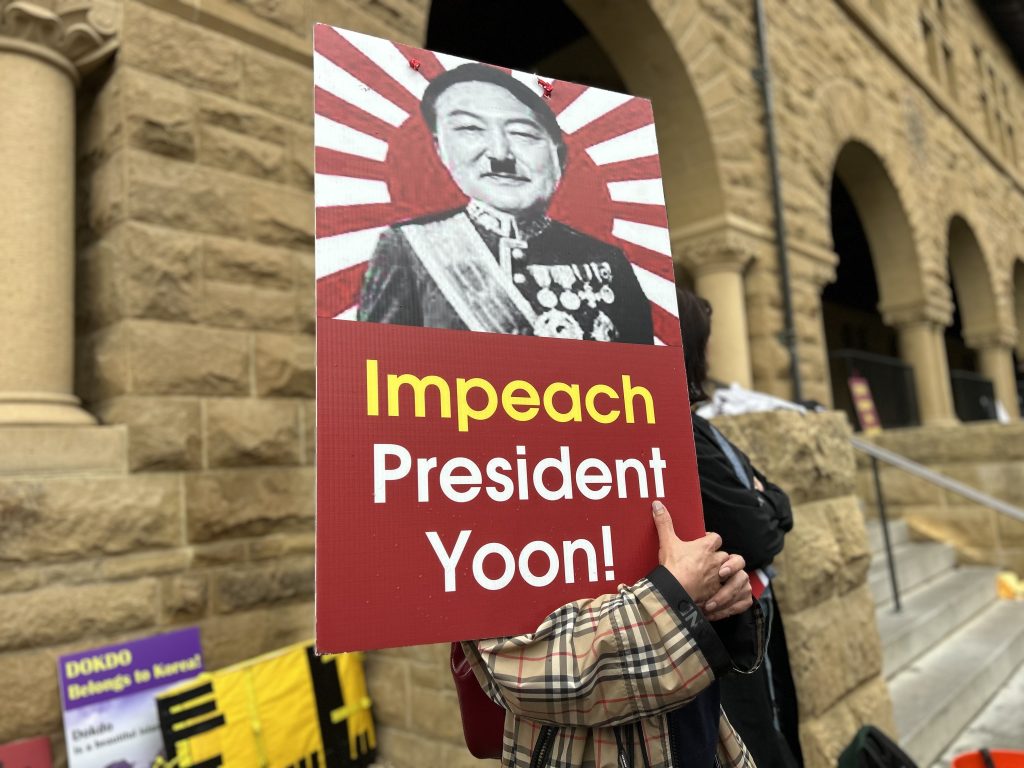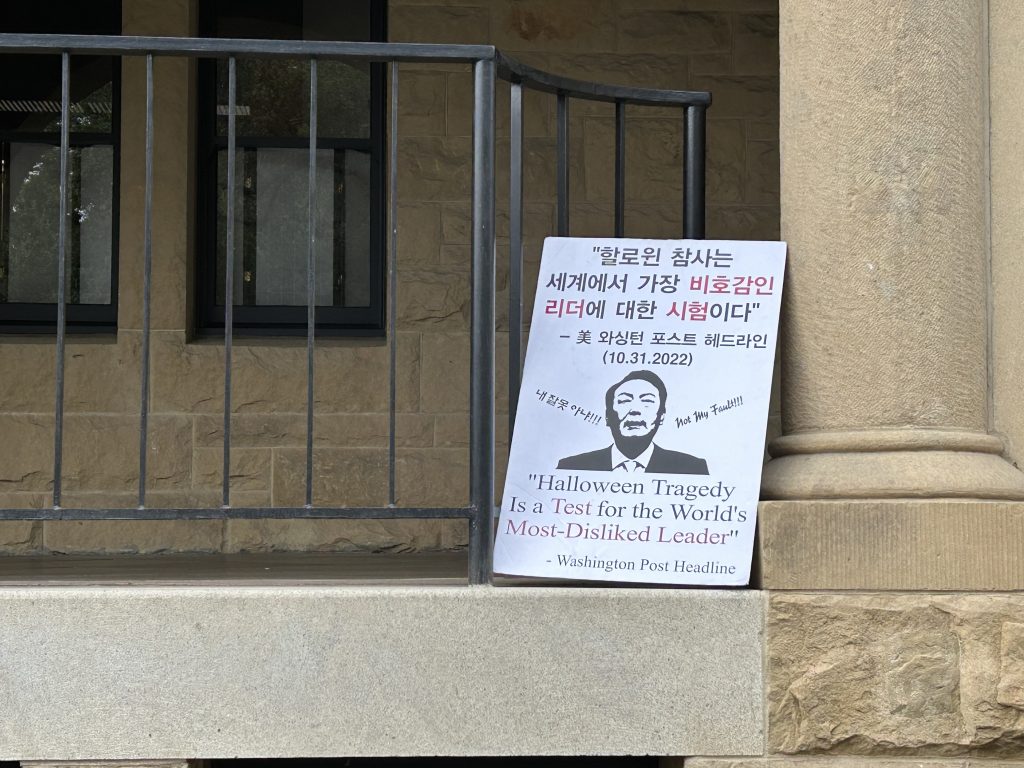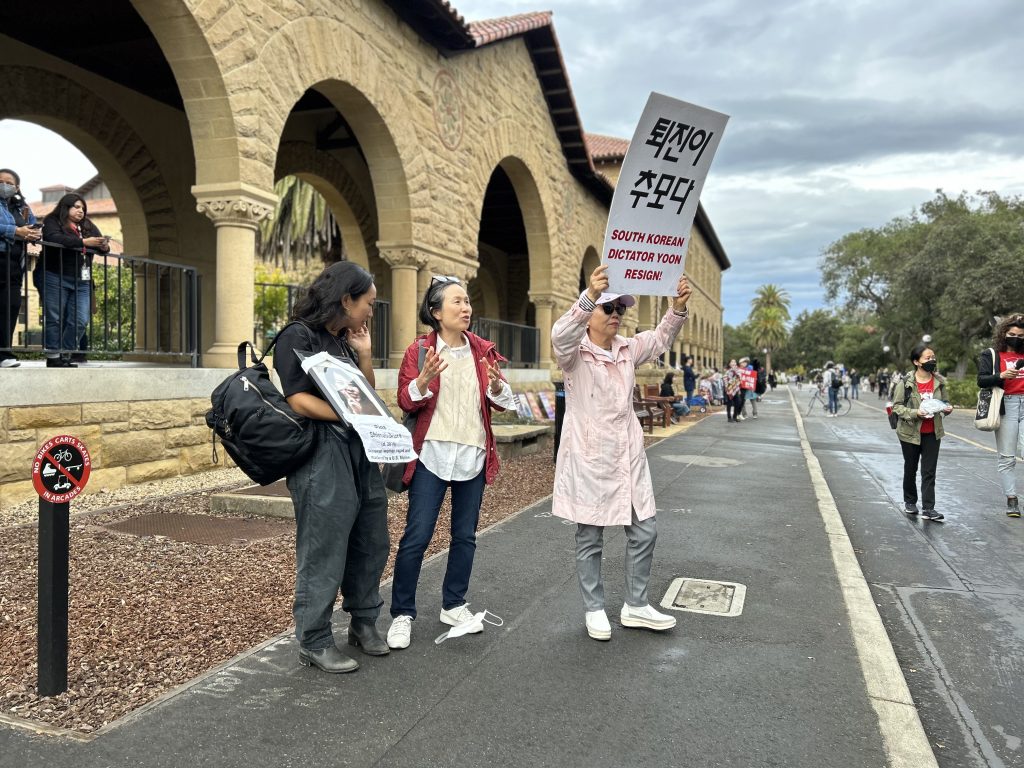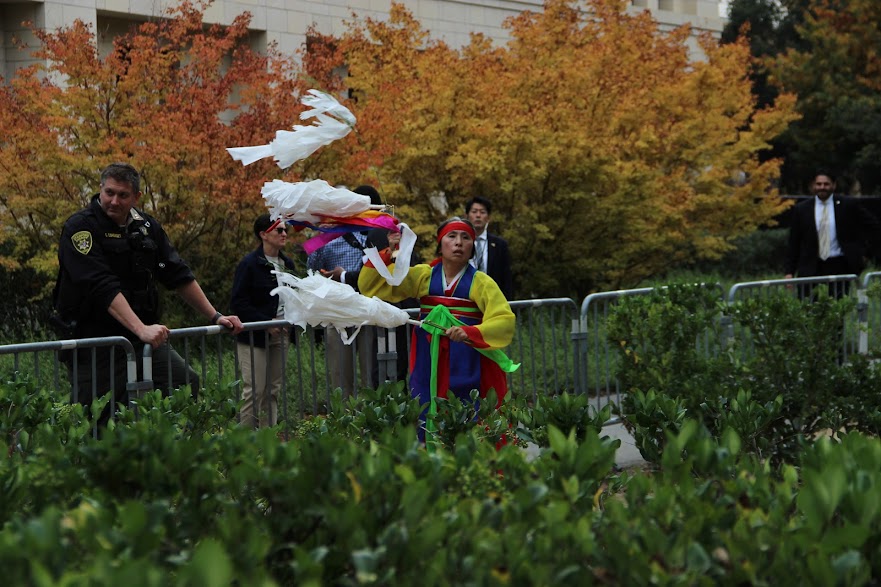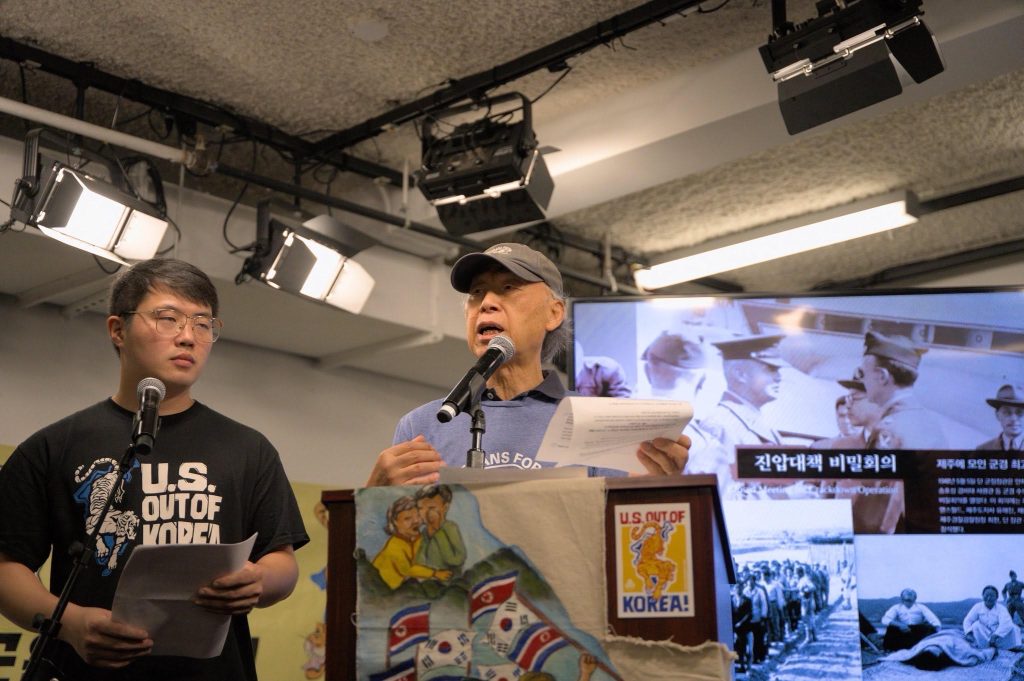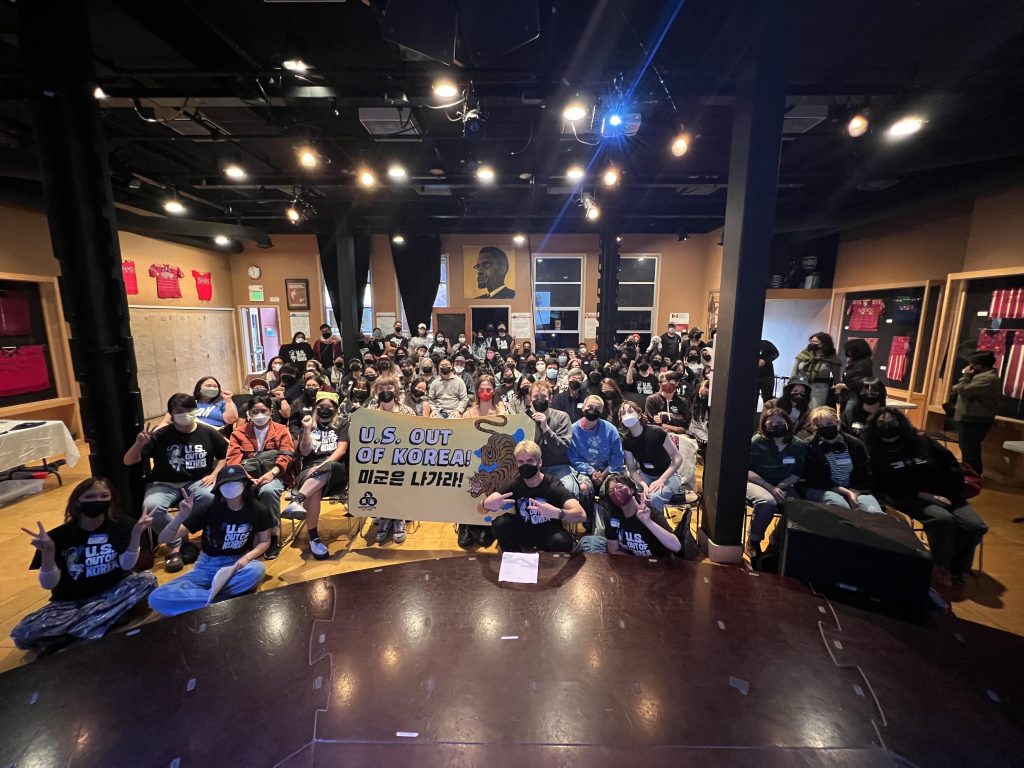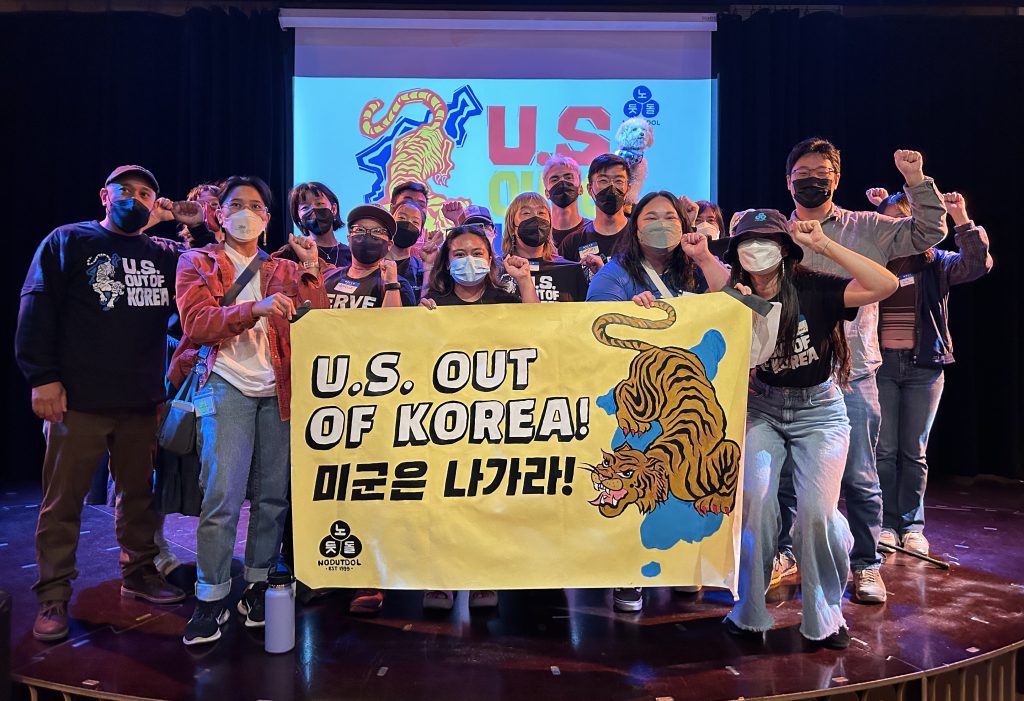By Jia H. Jung, California Local News Fellow
On the 79th anniversary of the Korean peninsula’s liberation from Japanese colonization on Aug. 15, Nodutdol (노둣돌), a non profit organization for Korean community development, rallied hundreds of diasporic Koreans, multicultural supporters, and members of kindred organizations at Wilshire Boulevard and Western Avenue in Koreatown, Los Angeles.
The anti-imperialist, pro-human rights advocates of demilitarization were opposing the annual Ulchi Freedom Shield (UFS) drills that the U.S. and the Republic of Korea (R.O.K.) armed forces will conduct together in South Korea from Aug. 19 – 29.
The rally echoed the perennial unrest in South Korea over the same annual military operations, in the wake of another delivery of approximately 240 North Korean balloons that were filled with ripe trash.
The L.A. event was the first of several coordinated actions to follow at 2 p.m. PT on Saturday, Aug. 17 outside the San Francisco Federal building at 90 7th Street, 1 p.m. on Sunday, Aug. 18 at Greeley Square Park in New York City’s Koreatown, and 5 p.m. ET on Sunday, Aug. 18 at 1600 Pennsylvania Ave NW in Washington, D.C. in partnership with Korea Peace Now.
Reheating Cold War
According to Seoul’s Joint Chiefs of Staff (JCS) and the U.S. Department of Defense, 19,000 R.O.K. troops and an undisclosed number of American soldiers will participate in 48 land, sea, air, and computer simulations to prepare for hypothetical military situations.
U.S. and R.O.K. officials say the program will focus on readiness for specific threats such as North Korean missiles, GPS signal obstruction, cyberattacks, field maneuvers, live fire, and other patterns of war.
NK News recently reported that both militaries denied having plans to run through scenarios of a North Korean nuclear attack. However, the South Korean military confirmed that R.O.K. forces will carry out its own nuclear exercises alongside UFS events.
These activities, which the Associated Press speculated could provoke the belligerence of North Korea, were an urgent topic at Nodutdol’s launch of a broader U.S. Out of Korea campaign on July 27. That day marked the 71st anniversary of the Korean War Armistice in 1953 that ended the Korean War.
Those vexed or curious about increased militarization in Korea convened in a standing room only meeting at the People’s Forum of Manhattan in Nodutdol’s founding location of New York City. Crowds also filled the Eastern Arts Alliance in Oakland, California and the Harriet Tubman Center in Los Angeles, while others watched the New York City broadcast online.
The organizers reminded the crowds that the 1953 armistice was a ceasefire that froze in place the three-year-long Korean War of “scorched earth” tactics that killed 35,000 members of the U.S. military and up to 5 million Korean civilians – 10% of the population at the time.
The heavily guarded Demilitarized Zone (DMZ) at the 38th parallel continues to divide the Korean peninsula. And South Korea, a quarter of the size of the state of California, still hosts 28,500 American troops in South Korea at sites like Camp Humphreys, the largest military base outside the U.S.
Last November, the U.S., which maintains complete control of The Republic of Korea (R.O.K.) military to this day, created a trilateral alliance with Korea and Japan, and a separate alliance with Japan and the Philippines.
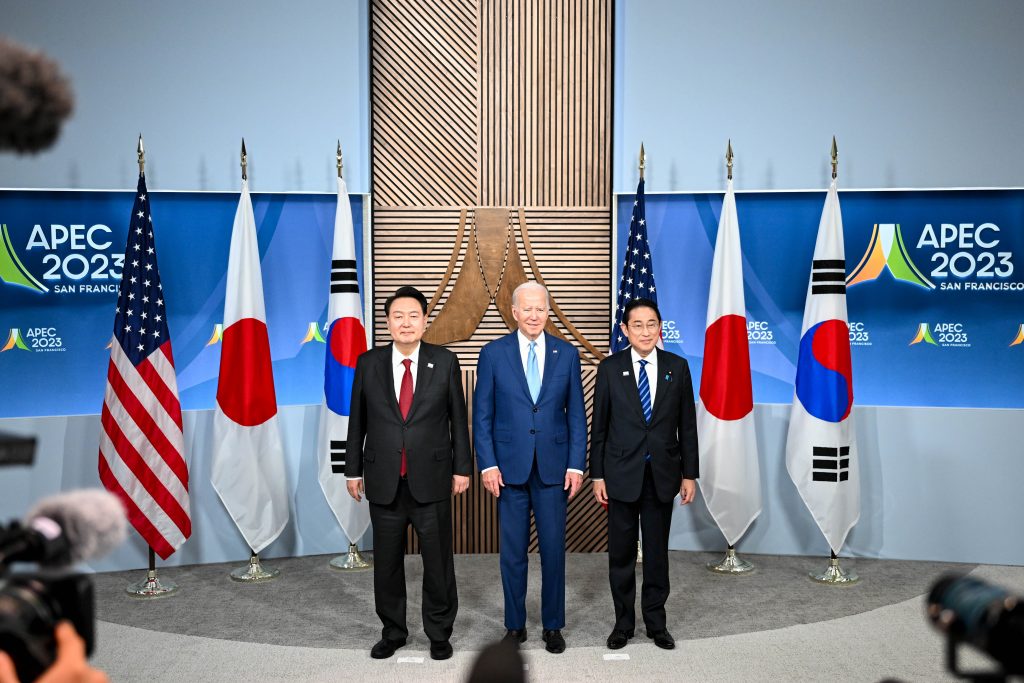
Acting under these structures, the U.S. has conducted over 200 military drills with South Korea alone in the past year, projecting power against China and North Korea.
The Democratic People’s Republic of Korea (D.P.R.K.) responded by announcing earlier this year that it was abandoning the idea of peaceful reunification with South Korea.
The U.S., ramping up its military activities not just in Korea but throughout the entire Asia-Pacific region and across the Pacific Islands, granted the R.O.K. military permission to make a preemptive strike on North Korea.
The two Koreas have since named each other as number one enemies – a turnaround from the nearly forgotten era of the Moon Jae-in administration from 2017 – 2022, when 86% of South Koreans wanted reunification.
A people-centered retelling of modern Korean history
Nodutdol is part of a growing contingent of diasporic Koreans and cross-cultural allies who trace their and their families’ journeys and lasting experiences back to war. They are overturning the narrative that U.S. militarization equates to safety and prosperity for America and other democratic countries.
“The first step, like a huge step, is the education – to have folks unlearn this propaganda so that they can really see the negative impacts of U.S. imperialism in South Korea and North Korea and develop a desire to want the U.S. out of Korea.” said Simon Ma, in a phone call with AsAmNews, shortly after speaking at the Oakland launch.
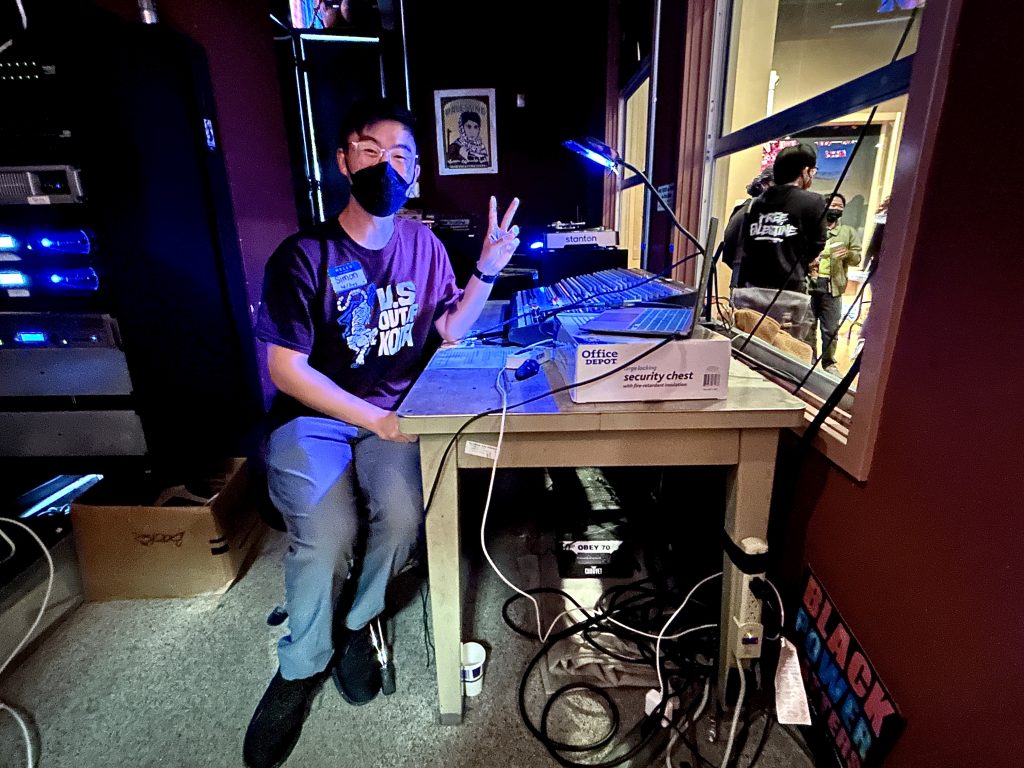
Ma, a family physician living in San Francisco, discovered Nodutdol online when he first moved up to the Bay Area in 2016 for medical school.
Reeling from unrest in Ferguson, Mo. after Darren Wilson, a police officer, shot and killed Michael Brown resonated with information Ma had heard from his father, who had been born in 1952, right in the middle of the Korean War.
In solidarity with the Black Lives Matter movement, he developed a desire to become more active within the Korean diaspora. and got involved with the now disbanded Hello Bay Area Organized Koreans (HOBAK, the Korean word for pumpkin).
In 2017, he traveled to South Korea on one of Nodutdol’s Korea Education and Exposure Program (KEEP) tours connecting the diaspora to the people, culture, and struggles in their origin country.
His life changed when he met the people of Soseong-ri, a small outpost where the U.S. military decided to install a Terminal High Altitude Area Defense (THAAD) ballistic missile site in the sleepy town.
“These are literally, 80-year-old farmers that just wanted to live out their lives working the land,” he said, of the community’s elders, who mainly grow chamoe, small, refreshing, semi-sweet yellow melons beloved by Koreans and growing in popularity worldwide.
The farmers’ resistance helped him see the effects of imperialism to his own grandparents and parents.
Ma, who increased his involvements with Nodutdol upon his return to the U.S. in 2017, visited the village again in 2023. He found the people of Soseong-ri continuing their resistance, inspiring him not to let up on his efforts to support them from across the ocean.
At their coordinated U.S. Out of Korea launch, Ma and other campaign organizers began with accessible summaries of modern Korean history that tied past events to current affairs.
At the Oakland location, a large screen provided factual documentation in the form of historical facts, infographics of data, citation of articles, photographs, and video footage, such as interview excerpts with the fighting grandmothers and grandfathers of Soseong-ri.
“Today, you are part of our history,” declared Ma, at the Oakland launch.
He detailed the extent of the American military and political influence on the establishment of South Korea and balanced anti-North Korean propaganda with a rundown of diplomatic measures met by the Democratic People’s Republic of Korea but abandoned by the U.S. over the years.
He encouraged people to look past the glitz and glamor of K-pop and see that Yoon Suk Yeol, likened by politicos in the know as the South Korean counterpart of Donald Trump, was not a good guy just because he sang American Pie with President Joe Biden.
South Korea’s recent history features long dictatorships backed by the U.S., and that the suppression continues today in the name of a National Security Law branding any challenger of the status quo as a Communist in cahoots with North Korea and propagator of anti-state activity.
Ma said that the National Security Law has been utilized by virtually every single South Korean leader in power despite the portrayal of the R.O.K. as a democratic miracle and bastion of democracy in Northeast Asia.
The point of all these protests: bringing foreign issues home for American diasporas
Conducting rallies and joining protests is how Nodutdol furthers awareness and draws people closer to what has been first and foremost a movement in education since the organization’s founding in 1999.
Last November, numerous heads of state in the the Asia-Pacific Economic Cooperation (APEC) descended upon San Francisco to hold panels and discuss trade deals affecting nearly half of all global trade and 40% of the world’s population.
There, a Korean American Stanford University undergraduate who goes by his first name Yungsu represented Nodutdol at a panel at a concurrent People’s Counter Summit.
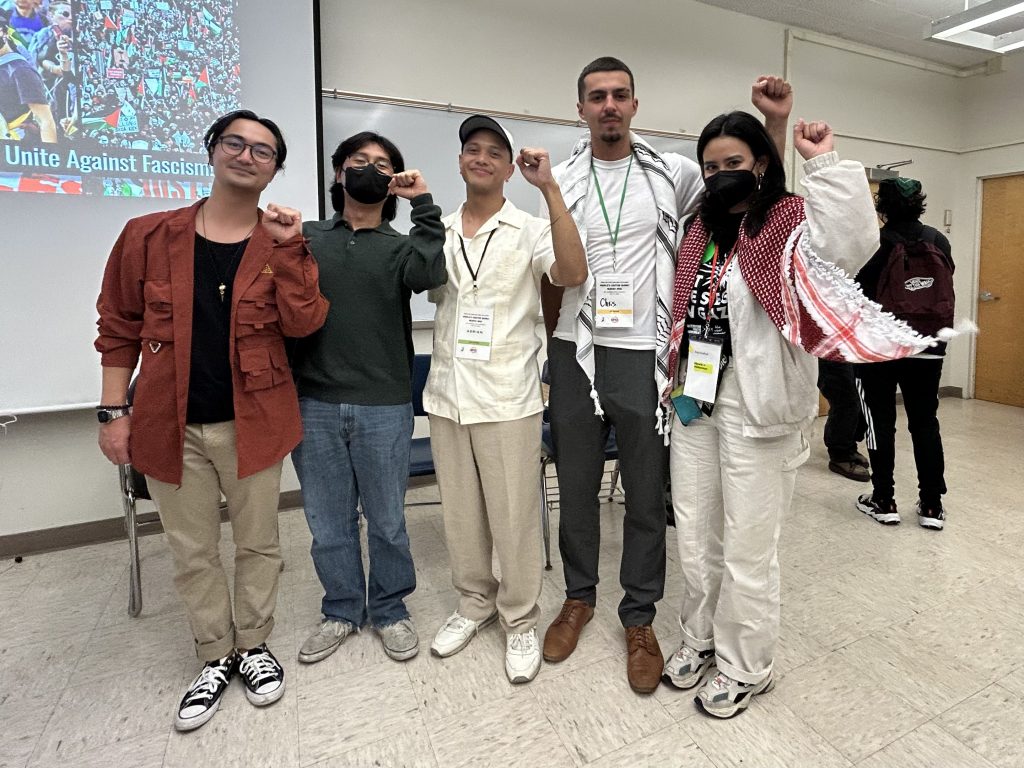
Together, he, and representatives of Filipino group BAYAN USA and the Palestinian Youth Movement connected the dots of American imperialism before a diverse, multigenerational audience. For example, they pointed out the powerful interests behind the division of Korea and establishment of Israel, which both happened in 1948.
(Nodutdol, with 30 official endorsers including the American Party for Labor, the Black Alliance for Peace, Jews Against White Supremacy, the Korea Policy Institute, and the United National Antiwar Coalition, supports the cause of Palestinian liberation.)
In the street protests surrounding the walled-in APEC events, a small but mighty showing of Nodutdol members and other supporters of the Korean cause marched down Market Street, between much larger Filipinos, Pacific Islanders, Palestinians, and Latin Americans, amplifying their small numbers with puk double-headed barrel drums and strident kkwaenggwari gongs.
Nodutdol and other organizations also protested outside a summit that same week hosted by Stanford’s Hoover Institution. There, former Secretary of State Condoleeza Rice mediated a conversation between South Korean President Yoon Suk Yeol and Prime Minister Kishida Fumio.
The event, presented as open to the public with advanced registration, was functionally private, granting access to an undisclosed list of limited press whose coverage revealed plenty of space left over inside.
After written inquiries by AsAmNews, Noa Ronkin, associate director of Stanford’s external relations, replied that the reason for the leftover seats had been a result of no-shows by exclusive press outlets and high-profile guests.
“Due to the high-profile nature of the event and the required security procedures, it was not possible to have a waitlist or a standby line to take advantage of these seats,” Ronkin wrote.
Stanford officials declined to respond to multiple requests by AsAmNews for any comment regarding the protest by many of its students, plus groups advocating for the interests of Filipinos, Okinawans, women, environmentalists, pacifists, and more.
Nodutdol’s stirring public actions in solidarity with other global anti-imperialist demilitarization movements carried through to 2024, when in March, Kari of Nodutdol spoke at a quiet Right to Truth commemoration of the lasting effects of war and militarization upon human beings, particularly women and children.
She told the story of “camptown” worker Yun Geum-i, raped and murdered at 26 by a U.S. private at a “camptown” near a base in October 28th, 1992. She relayed the more recent tragedy of Byun Hui-su’s the first active duty soldier in the R.O.K. Army to undergo gender confirmation surgery. Forcibly discharged after surgery, Byun was found dead of unconfirmed causes in her apartment in March 2021.
“The roots of patriarchy in Korea are deep,” Kari said, in a firm yet quivering voice. “But contemporary gender politics and transphobia are deeply shaped by the enormous influence of the R.O.K. military as a neocolonial institution of the U.S. – the neocolonial R.O.K. Army that violently protects the interests of the U.S. empire will never be a liberatory place for queer, trans Koreans.”
One of the event’s head coordinators was Miho Kim, a Zainichi Korean – an ethnic Korean born and raised in Japan with no citizenship because of the country’s imperial policies during World War II.
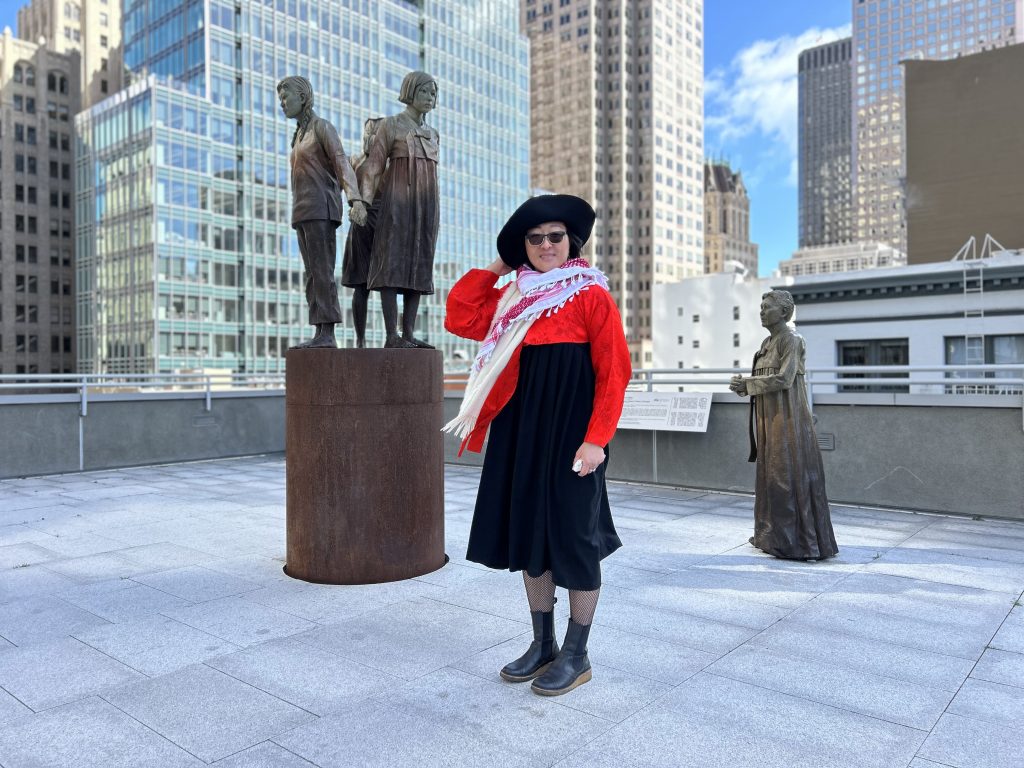
Kim, a data researcher and university researcher, is co-convenor and coordinator of the Comfort Women Justice Coalition of San Francisco with the goal of supporting the fight for justice by dwindling numbers of surviving “comfort women” conscripted into sexual slavery by the Japanese Empire during World War II.
She is also a founding member of Eclipse Rising, a community for Zanichi Koreans seeking to remember the history of Koreans in Japan, promote Zainichi community development, work toward peace and reunification between North and South Korea, and work for social justice for all minorities in Japan.
Sitting at the foot of a memorial of bronze statues of Korean women and girls systemically raped by the two empires of the U.S. and Japan, Korean drummers brought a rousing finale to the observation of the effect of imperialism, militarization, and war on women, children, and everyday working people.
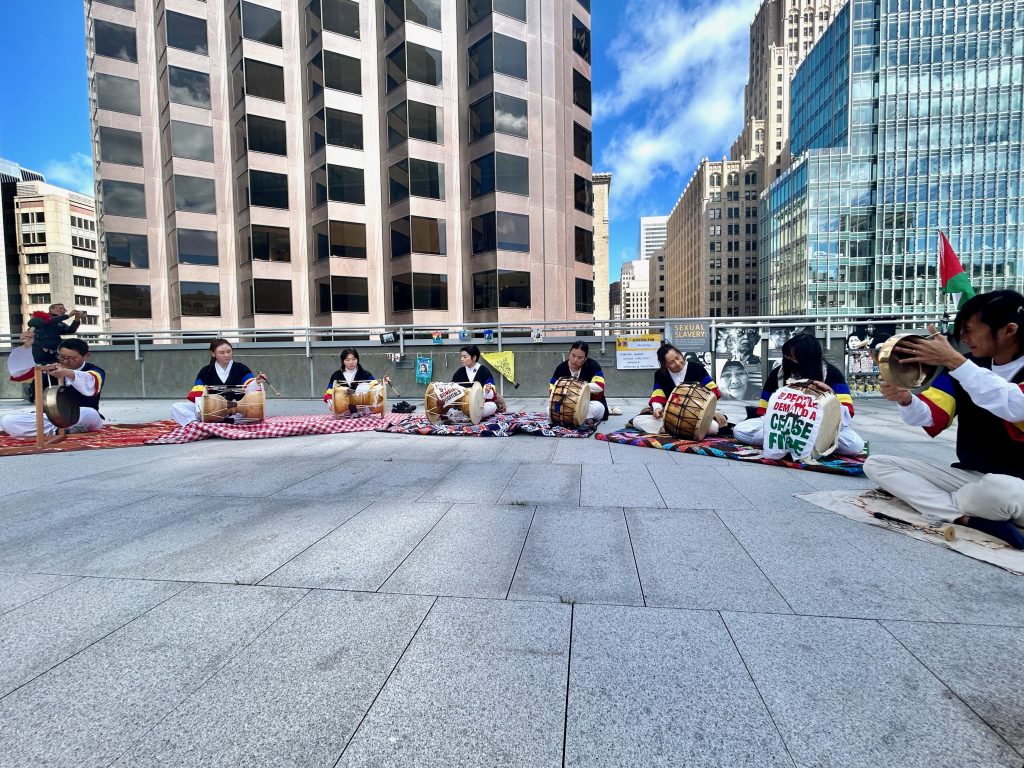
So far, Solidarity for Peace and Reunification of Korea (SPARK), the Korean Confederation of Trade Unions (KCTU), and a member living in Korea and working at the International Strategy Center are among Nodutdol’s pulse-keepers overseas.
Nodutdol does not yet have a corresponding headquarters or branch in Korea the way groups such as BAYAN USA or the Palestinian Youth Movement do.
“That could be a next step,” Ma surmised.
How to get hearts and minds to believe in a post-imperialist world
At the Oakland U.S. out of Korea launch, half-Korean activist Dooboo (the Korean word for tofu) and Korean American Heejoo tag-teamed to give a breakdown of how much the U.S. spends in military pursuit of state interests versus how little it spends on increasing social problems here at home.
Dooboo said that people had to see the U.S. for what it really is – an empire in decline. He added that resistance to imperialism was existential. “It is legitimate self-defense – a human right, the right to survive,” he said.
Jeeho brought everything home by saying that the U.S. is the richest country in the history of the world with the poorest social welfare among wealthy, developed nations. Simultaneously, the U.S. outpaces every other country in its spending on overseas wars and military activity ($1.5 million), incarceration ($880 billion), and policing ($100 billion).
“What if the wealth created by the working people went to working people?” she asked, imploring the audience to think outside the box, before the group shared the four demands of its campaign.
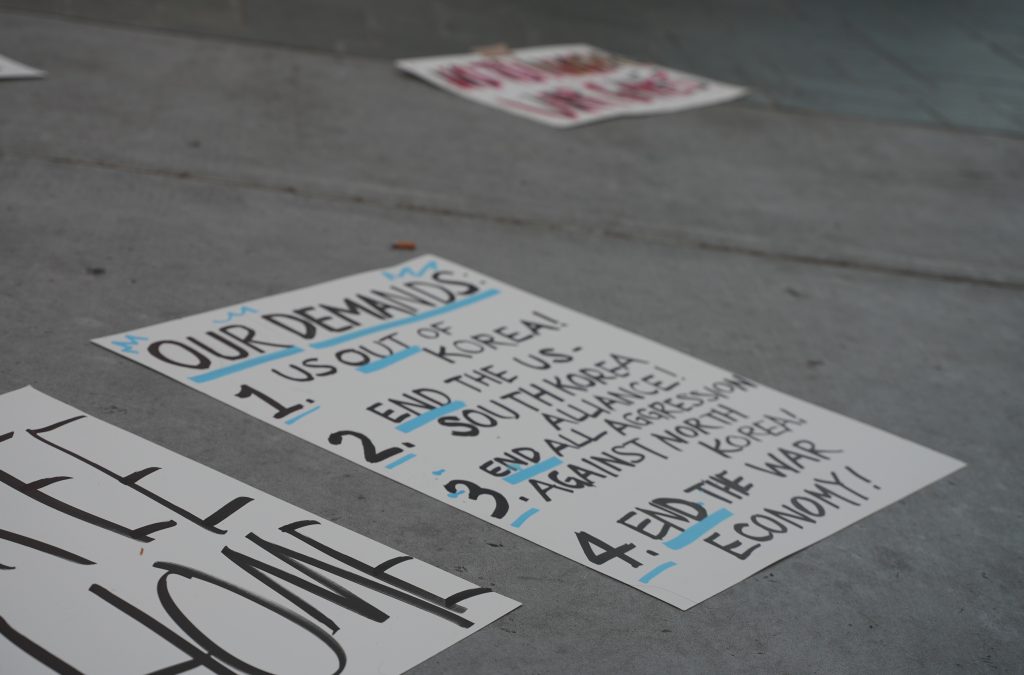
More specific calls to action included following Nodutdol’s Instagram account for mobilization announcements and other information and just looking into history.
Nodutdol knows that its goals for total withdrawal of U.S. military involvement in Korean affairs and all transactions associated with it, plus an end to all aggression and sanctions toward North Korea cannot be met today or tomorrow. But, the organization no longer accepts that these conditions are merely idealistic.
“Despite the immense amount of power that the U.S. imperialists and billionaires hold, the people who hold the power are like the working people. Without the masses of the working people like this world and society would not function,” Ma said. Nodutdol is one of many organized forces trying to combine the masses to bring a global end to the structures that have hurt them.
Ma pointed to supporters of the Palestinian cause as a shining example of hearts and minds being won in support of positions previously suppressed as radical and anti-state.
“Through their organizing and tireless education and mobilizations and rallies, and really using this crisis moment to educate and organize the masses, they’ve built this huge movement of support where, now, popular support is for Palestine, which is something that you wouldn’t have ever even imagined a couple years ago,” he said.
Ma cautioned it did take many decades of mobilization and education for this to happen. He recalled the backlash in the past to people opposing the war in Iraq from 2003 – 2011 and speaking out in defense of the human rights of Palestinians in a post 9/11 environment.
“The Palestinian organizations had to have decades of base-building and foundation building leading up to this point. Hopefully, we’ll be able to do the same thing and not need decades to organize it, because the crisis moment is coming very soon for Korea,” he concluded.
Support our June Membership Drive and receive member-only benefits. With less than three days left in our fundraising drive, we are running out of time. We are just 57% of our goal of $10,000 in new donations and monthly and annual donation pledges and 48% of our goal of gaining 25 new recurring donors by the end of the month. We need your help during these challenging times. Please help to ensure quality content in amplifying the voices of the AAPI community.
We are published by the non-profit Asian American Media Inc and supported by our readers along with the Robert Wood Johnson Foundation, AARP, Report for America/GroundTruth Project & Koo and Patricia Yuen of the Yuen Foundation.
You can make your tax-deductible donations here via credit card, debit card, Apple Pay, Google Pay, PayPal and Venmo. Stock donations and donations via DAFs are also welcomed. Contact us at info @ asamnews dot com for more info.


